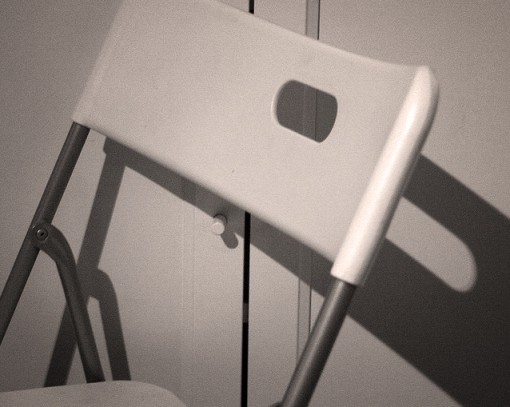Brian Evenson
This week we’re very pleased to offer up three short reports by Brian Evenson—running Monday, Wednesday, and Friday.
A few years back I was recruited by a friend, J., who is now an ex-friend, to come over and assemble an Ikea chair for a dinner party that was to be held later that day. Using a hex key enclosed in the packaging and a screwdriver I brought from home, I assembled the chair successfully and relatively quickly. When I was done, at J.’s request I signed my chair on the underside of the seat—something he claimed, perhaps fallaciously, was often done in his country of origin (i.e. Canada). A few minutes later, I sat on my chair and stayed sitting on it through the dinner.
I rarely think about this chair, but I do nevertheless think about it sometimes. When I do, it is usually to wonder about my ex-friend J. and his current relationship to the chair. Though I rarely wonder about this, I wonder about it more often, oddly enough, than I wonder about his relationship with my ex-girlfriend, with whom he now lives. I ask myself, Does J. think about my signature when he sits on the chair I built?
I could call him or send him an email to ask, but to do so might cause him to believe that I wanted to renew our friendship. I do not want to renew the friendship: I am much happier not being friends with J. But still, I wonder if he ever remembers the fact that the chair he is sitting on has my name written on it.
The signature has nothing to do with the chairness of the chair. The chair would still be a chair if I had not signed it, and my signature doesn’t make it any more of a chair. But the signature does have everything to do with the particularity of the chair. I could distinguish that chair from the other four Ikea chairs at J.’s table because of it, and could, probably, distinguish it from every other chair in the world, unless someone went to the trouble of forging my signature on another similar chair. It is the only chair in the world with my signature on it. It still possesses its chairness, but, in addition, it has become unique in a way that can be easily determined. We never sit on the idea of a chair, but particular chairs that are real and solid. Such particularities, which cannot be abstracted into chairness or other nesses, are the things with which we populate our lives. Through them, we move from experiencing lifeness to having an actual and unique individual life. There is no value to lifeness without life, just as there is no value to chairness without a chair.
How comfortable am I with J. populating his actual and unique individual life with the particularity of this chair, a particularity that I intensified by inscribing my name on it? If I were, for some reason, in his house—which I haven’t been in for years—and had a moment to myself because, say, a fire broke out in the kitchen, would I take advantage of that moment to flip the chairs over until I found the chair I had signed? And then, using a sharpie like the one I originally used to sign the chair, blot out my name?
I don’t know. I do carry a Sharpie in my computer bag, but I don’t think this is why.
Who knows if he even has this chair anymore? If I were him, I would have thrown it away, as indeed I did with so many of the things my ex-girlfriend left behind. But would he? I suspect not, knowing what sort of person he was back when we were friends, but again, if I were to call him to ask, he will see it as an overture to renew the friendship. I do not want to renew the friendship, even if it means never finding out what became of the chair.
And so I will continue in my own particularity of being me, here, as I always do, and the chair, if it still exists, will continue in its particularity of being a chair, either in my ex-friend’s house or elsewhere, without these two particularities ever touching. Except for here, in the abstract, on this page.
Brian Evenson is the author of a dozen books of fiction, most recently the story collection Windeye (Coffee House Press 2012) and the novel Immobility (Tor 2012), both of which were finalists for a Shirley Jackson Award. His novel Last Days won the American Library Association’s award for Best Horror Novel of 2009). His novel The Open Curtain (Coffee House Press) was a finalist for an Edgar Award and an International Horror Guild Award. Other books include The Wavering Knife (which won the IHG Award for best story collection), Dark Property, and Altmann’s Tongue. He has translated work by Christian Gailly, Jean Frémon, Claro, Jacques Jouet, Eric Chevillard, Antoine Volodine, Manuela Draeger, David B., and others. He is the recipient of three O. Henry Prizes as well as an NEA fellowship. His work has been translated into French, Italian, Spanish, Japanese and Slovenian. He lives and works in Providence, Rhode Island, where he is Royce Professor of Teaching Excellence in Brown University’s Literary Arts Department.

